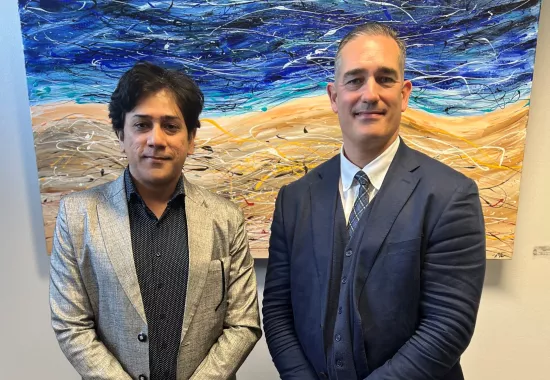Leading researchers from the Kolling Institute have welcomed the opportunity to collaborate with Metakosmos as it pioneers the development of a next-generation space suit.
Led by CEO Kiriti Rambhatla, Metakosmos is working to revolutionise human spaceflight technology. Their Kosmosuit architecture has garnered acclaim and the interest of the Kolling Institute’s Academic Director Professor James Elliott.
Since 2020, Metakosmos has worked with the CSIRO and the Department of Defence to improve production processes. Their research focuses on three key areas: wearer protection, aesthetic design and mitigating physiological impacts such as space radiation and microgravity.
Space radiation for example, can have detrimental effects on the musculoskeletal system, including bone density loss, muscle atrophy, joint degeneration, impaired healing and increased injury risk. Astronauts can come back to Earth five to eight centimetres taller.
There is also a risk of injuries during extra vehicular activity preflight training periods prior to space radiation or microgravity exposure. Metakosmos is working on designing systems that can protect the users from injuries during the entire lifecycle of human spaceflight.
Metakosmos and colleagues are close to unveiling an application that will redefine the way human spaceflight lifecycles are monitored and managed at scale.
Incorporating biomarker tracking, Metakosmos’ suits monitor astronauts’ musculoskeletal health, stress levels and radiation exposure in real-time. With a 40 per cent increase in efficiency and 50 per cent reduction in total mass, these suits support performance in extreme conditions.
Metakosmos’ designs cater to various environments, from deep-sea operations to international space station missions. Their collaboration with the Kolling Institute underscores a commitment to advancing human spaceflight capabilities and terrestrial based health, performance and wellbeing.
James Elliott first met Kiriti Rambhatla at a space consortium hosted by the Kolling Institute in collaboration with the Australasian Society of Aerospace Medicine.
“We immediately realised we had synergies,” he said.
“Kiriti was interested in our collaborative multidisciplinary work towards measuring wellbeing after trauma. Not much is known about long-term post-trauma recovery, and no two recoveries are the same.
“Kiriti was intrigued by our methodology, which involves collecting comprehensive physiological data, creating pathways that work on simulated models, and addressing modifiable environmental factors, such as trip hazards and fall risks.
“Our research is continually evolving as we measure and refine our approach. The Kolling Institute’s interest in muscle mapping aligns perfectly with the goals of Metakosmos, and we are integrating our findings to support this area.
“By leveraging their combined expertise, Metakosmos and the Kolling Institute, among other institutions, are breaking new ground in wearable technology for extreme environments, marking a significant step forward in human health and performance on earth and beyond.”
